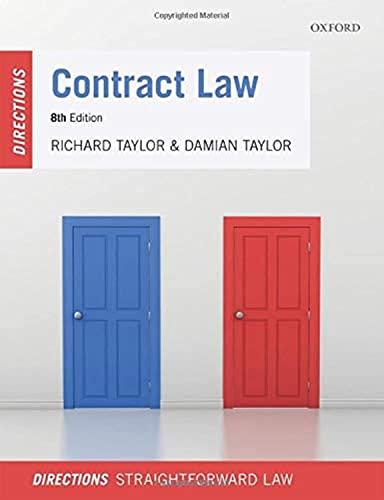Question
A. Would Davidson Masonry automatically be taxed as a partnership or a corporation? B. Is Davidson Masonry member managed or manager managed? C. When Davidson
A. Would Davidson Masonry automatically be taxed as a partnership or a corporation? B. Is Davidson Masonry member managed or manager managed? C. When Davidson Masonry and Lafayette entered into an agreement to work together, what kind of special business form was created? Explain. D. Suppose that during construction, Lafayette entered into an agreement to rent space in a warehouse that was close to the bridge so that she could work on her sculptures near the site where they would eventually be installed. She entered into the contract without the knowledge or consent of Davidson Masonry. In this situation, would a court be likely to hold that Davidson Masonry was bound by the contract entered into by Lafayette? Why or why not?
3.A. Under what theory might the court in this case make an exception to the limited liability of shareholders and hold Sharp personally liable for the damages? What factors would be relevant to the court's decision? B. Suppose that Chickasaw's articles of incorporation failed to describe the corporation's purpose or management structure, as required by state law. Would the court be likely to rule that Sharp is personally liable to Dancause on that basis? Why or why not? C. Suppose that the club extended credit to its regular patrons, although neither the articles of incorporation nor the corporate bylaws authorized this practice. Would the corporation likely have the power to engage in this activity? Explain. D. How would the court classify the Chickasaw Club corporationdomestic or foreign, public or private? Why?
4A. What duties did Brock, as a director, owe to Firm Body? B. Does the fact that Brock owned shares in Sunglow establish a conflict of interest? Why or why not? C. Suppose that Firm Body brought an action against Brock claiming that he had breached the duty of loyalty by not disclosing his interest in Sunglow to the other directors. What theory might Brock use in his defense? D. Now suppose that Firm Body did not bring an action against Brock. What type of lawsuit might Peada be able to bring based on these facts?
5. Did Gain engage in insider trading? What is required to impose sanctions for this offense? Could a court hold Gain liable? Why or why not? (See The Securities Exchange Act of 1934.)
Step by Step Solution
There are 3 Steps involved in it
Step: 1

Get Instant Access to Expert-Tailored Solutions
See step-by-step solutions with expert insights and AI powered tools for academic success
Step: 2

Step: 3

Ace Your Homework with AI
Get the answers you need in no time with our AI-driven, step-by-step assistance
Get Started


